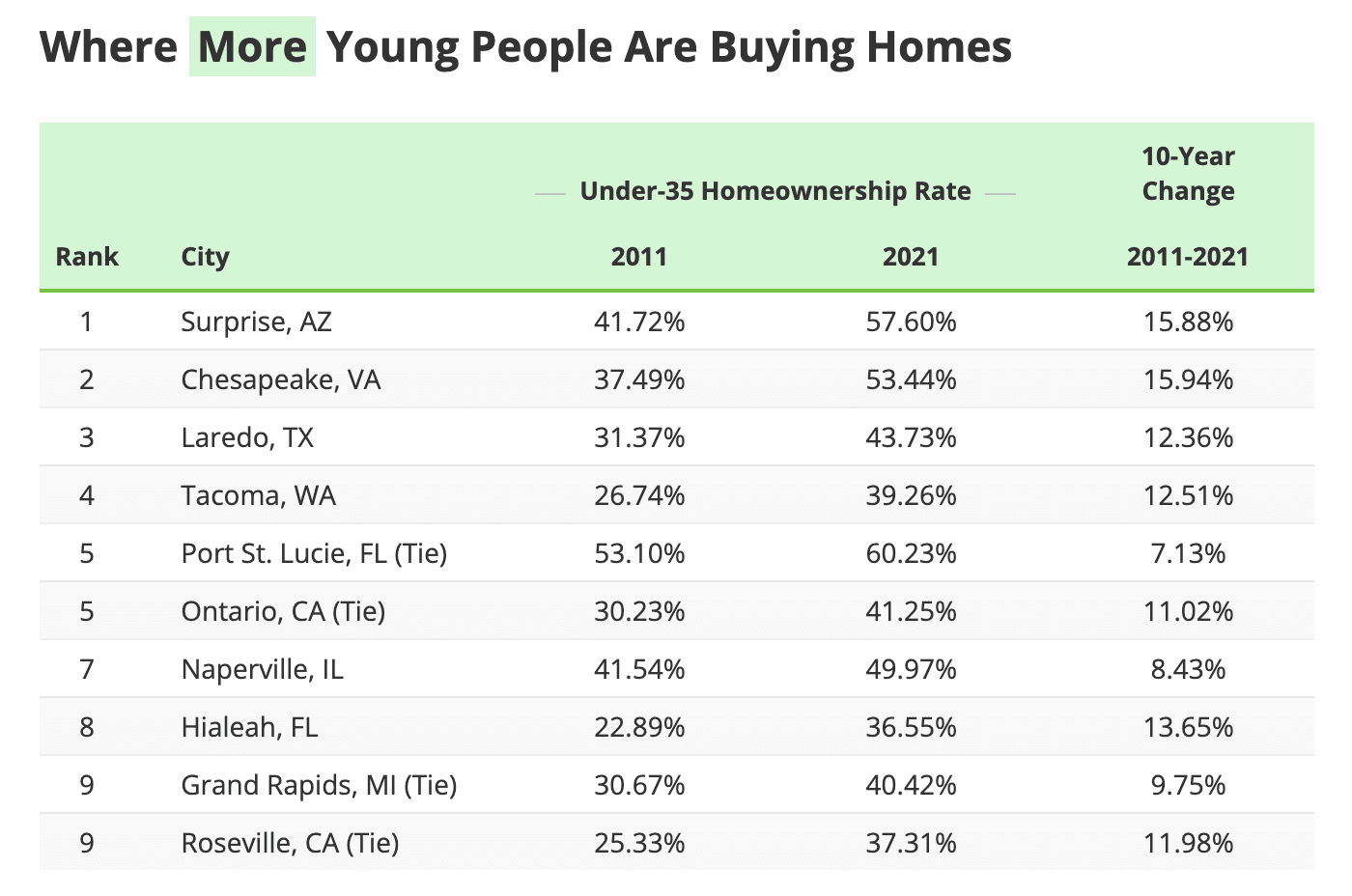First-time homebuyers, young buyers, millennial buyers — these terms are often used interchangeably to describe the newest crop of hopeful homeowners. But as millennials make up 43% of current homebuyers — the highest share of any generation — their patterns warrant a closer look. Where are millennials moving to in the Chicagoland area? And what are they looking for?
Millennials are currently the largest generation group in the U.S., surpassing Baby Boomers with an estimated population of 72.19 million. There are so many millennials, in fact, that the National Association of REALTORS® (NAR) broke the generation into two parts for their 2022 Home Buyers and Sellers Generational Trends Report. An older millennial, also called “Older Gen Y,” is defined as having been born between 1980 and 1989, while the “Young Gen Y” was born between 1990 and 1998.
In 2021, the average age of a first-time homebuyer was 33 years old — placing them squarely on the cusp of Older and Younger Gen Y. And right now, those first-time homebuyers are making moves. Recently data from Zillow reveals that first-time homebuyers now make up 45% of current homebuyers: an 8% bump from last year.
The increase represents a rebound from the distinct low seen in 2021, when affordability challenges coupled with tough competition severely limited first-time buyers. A past Zillow survey found that 45% of Gen Z and 38% of millennial buyers lost out to all-cash buyers at least once. But now, amid rising interest rates, repeat buyers are pulling back. And the result is a rebalanced market working in favor of first-time buyers.
And apparently, those younger shoppers are flocking to a certain Chicago suburb.
A recent study by the fintech company SmartAsset identified Naperville as the No. 7 most popular metro for homeowners under 35. SmartAsset took the 200 largest metros in the U.S. into account and compiled the ranking based on two metrics: the 2021 homeownership rate for people aged under 35 and the 10-year change in homeownership rate for people aged under 35. The result showed strong growth for the Naperville.
In Naperville, nearly half of homeowners are younger than 35, which reflects a 10-year jump of more than 11%. This is especially stark considering that the city proper came in at No. 137 on SmartAsset’s ranking, with a below-35 home ownership rate of just 1.52%.
John Vinicky, an agent with the Anne Monckton Group at Baird & Warner, covers the area and spoke to Chicago Agent about the Naperville boom. Compared to other suburbs, Vinicky explained, “Naperville is a much bigger municipality, in terms of square miles. It also offers a lot of mobility in a marketplace,” Vinicky said. “People can … find a starter home or a bigger home with less competition, as opposed to in a highly competitive market with a bunch of micro markets within it.”
Namely, the urban market. Unlike in Chicago, Naperville has ample space to grow through new construction. Stefanie Lavelle, a broker associate at the Lavelle Group with @properties, discussed this too. “Naperville is a new city as opposed to others, [like] the North Shore,” she said. “It was very small and, over the last 15 years, has become gigantic. So, we’re seeing tons of new construction there because it’s a growing community.”
And new construction is a boon to younger millennials. “A lot of the younger buyers like new,” Lavelle said. She primarily sells in the city and has noticed the same pattern there among young buyers. “[They] are wanting to take on things that aren’t projects,” she said. “Less repairs.”
Certainly, the popularity of amenity-rich apartments have played a role in that desire. “Rental buildings have become so nice that people are willing to throw more money at it,” Lavelle said. But with rents rising post-COVID, that option is increasingly unattainable … and purchasing looks like a smart decision.
These are some of the primary reasons that first-time buyers are willing to step into the market, despite high interest rates. Damone Richardson, a Realtor with Coldwell Banker, offered another perspective on the shifting situation. “Someone who refinanced in the last three or four years has no motivation to cash out and take on a mortgage at 7%. And because they own their homes and got a great rate, they’re willing to wait it out,” he said. “[But] in regard to the younger buyers who are forging ahead, they want to just get into a home and start gaining the equity.”
Richardson, who sells primarily in Chicago, says that first-time homebuyers make up between 30% and 35% of all his business. Meanwhile, for Vinicky, who sells entirely in the western suburbs, it’s about half. So, it would seem the numbers behind SmartAsset define that community.
But of course, millennials are not a monolith. And numbers alone don’t tell the whole story of what it is they want from a home. As Richardson put it simply: “There is a difference between someone who wants to live in Naperville and live in the city.” And while the numbers of young Chicago homeowners may be low, for now, agents are confident they will rebound as the post-pandemic years wear on.
For example, Lavelle was not surprised to see a significant drop of first-time buyers during 2021. As COVID prompted a mass exodus of young professionals from the city, those people returned throughout last year. However, Lavelle said, “There was still uncertainty. They weren’t going to immediately buy, they were going to see how things go.” This would be a natural course, as first-time homebuyers are usually hesitant to begin with.
Whether you’re shopping Naperville or the city proper, “As a first-time buyer, you want to make sure everything is 100% perfect,” Vinicky agreed. And Richardson, too, emphasized the wariness of that particular group. “First-timers have an abundance of caution,” he said. This is even more apparent in Chicago, where, after losing out on bids, many would-be buyers re-upped on their leases. But as those leases come to a close — and the city continues its resurgence — perhaps young homebuyers will increase their market share.

